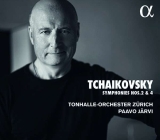 Piotr Tchaikovsky: Symphonien Nr. 2 & 4; Tonhalle Orchester Zürich, Paavo Järvi; 1 CD Alpha 735; Aufnahme 2020, Veröffentlichung 09/04/2021 (76'10) – Rezension von Remy Franck
Piotr Tchaikovsky: Symphonien Nr. 2 & 4; Tonhalle Orchester Zürich, Paavo Järvi; 1 CD Alpha 735; Aufnahme 2020, Veröffentlichung 09/04/2021 (76'10) – Rezension von Remy Franck
Keine zwei Minuten brauchte ich in Tchaikovskys Zweiter unter Järvi, um für mich zu entscheiden, dass ich diese Interpretation nicht mag. Statt den Klang zu bündeln, die Musik richtig zu atmen und zu formen, verzerrt ihn Järvi mit einem ausgeprägten Hang zu Transparenz und Auffächerung der Klanglinien. Diese Durchsichtigkeit, dieses Ausziehen des Klangkörpers, die Überdynamisierung und das glamouröse Farbenspiel stehen dem für mich wahren Charakter der Musik entgegen.
Überakzentuierung und völlige Abwesenheit der russischen Seele zeigen sich auch im zweiten Satz, einem Andante, aus dem Järvi ein Allegretto macht. Das Scherzo gelingt Järvi noch am besten, denn im Finale ist er, wie schon sein Vater Neeme, demonstrativ, wo ein Kitajenko das Espressivo weitaus besser dosiert und so beeindruckend den großen Bogen schließt, der mit dem einleitenden Orchesterschlag im ersten Satz begonnen hat.
Mit dem Kampf gegen das Fatum, wie es sich im ersten Satz der Vierten äußert, kommt Järvi besser zuwege, auch wenn er den Klang nicht so kohärent und aus dem Nukleus heraus formen kann wie das Kitajenko mit einem einfach als richtig anzusehenden Atem erreicht hat. Sicher, ich weiß es ja, ich habe, wenn es um Tchaikovsky geht (und auch um Shostakovich) den Kitajenko-Impfstoff bekommen, und wenn meine Ohren in der Musik beider Komponisten Varianten ausgesetzt werden, reagieren sie mit Frösteln. Aber dagegen kann ich nichts machen. Ich bin eben geimpft. Järvis Atem geht mir zu schnell und vor allem zu unkontrolliert, auch im Pizzicato-Abschnitt der Vierten, das mit den Küken aus Mussorgskys Bildern einer Ausstellung konkurrieren kann.
Tchaikovsky kann man mit Dynamisierung nicht beikommen. Er war kein Zappelphilipp. Wenn der Fatalismus, das Desillusionierte seiner Musik nicht zum Tragen kommen, läuft etwas falsch. Tchaikovsky hat, wie der französische Publizist Michel Hoffmann sagte, weder die starken Farben eines Borodin noch die orientalische Würze eines Rimsky-Korsakov. Er war der Russe, wie ihn Maxim Gorki beschrieben hat, jemand der sich liebend gerne mit seinem eigenen Unglück tröstet und in dessen Alltag selbst der Schmerz ein Fest ist. Das Fatum, so sagte der Komponist, müsse man akzeptieren und sich einer grenzenlosen Verzweiflung hingeben. Das alles steht im Widerspruch zu Järvis Sicht auf Tchaikovsky.
It took me less than two minutes into Tchaikovsky’s Second under Järvi to decide for myself that I didn’t like this interpretation. Instead of focusing the sound, breathing and shaping the music properly, Järvi distorts it with a pronounced tendency toward transparency and displaying the lines. This transparency, this undressing of the sound-corpus, the over-dynamization and the glamorous colors are contrary to what for me is the music’s true character.
Over-accentuation and complete absence of Russian soul are also evident in the second movement, an Andante that Järvi turns into an Allegretto. Järvi still succeeds best in the scherzo, for in the finale he is demonstrative, as was his father Neeme, where a Kitajenko doses the espressivo far better, impressively closing the great arc that began with the opening orchestral blast in the first movement.
Järvi does better with the struggle against the Fatum as expressed in the first movement of the Fourth, even if he cannot shape the sound as coherently and from the nucleus as Kitajenko achieved with what can simply be seen as the right breath. Sure, I know it, I’ve gotten the Kitajenko vaccine when it comes to Tchaikovsky (and Shostakovich, too), and when my ears are exposed to variants in the music of both composers, they react with chills. But there’s nothing I can do about that. I’m just vaccinated. Järvi’s breathing is too fast and especially too uncontrolled for me, even in the pizzicato section of the Fourth, which rivals the chicks in Mussorgsky’s Pictures at an Exhibition.
Tchaikovsky cannot be approached with dynamization. He was no fidgeter. If the fatalism, the disillusionment of his music does not come to bear, something is wrong. Tchaikovsky, as the French publicist Michel Hoffmann said, has neither the strong colors of a Borodin nor the oriental spice of a Rimsky-Korsakov. He was the Russian as Maxim Gorky described him, someone who loves to console himself with his own misfortunes and in whose everyday life even pain is a celebration. Fate, the composer said, must be accepted and surrendered to a boundless despair. All this is at odds with Järvi’s view of Tchaikovsky.

























